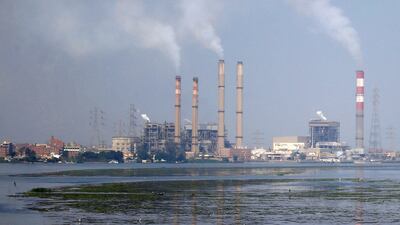Egypt has increased electricity prices for residential and business customers by up to 50 per cent, a senior source at Egypt's Ministry of Electricity and Renewable Energy told The National on Tuesday.
The Ministry of Electricity and Renewable Energy did not announce the decision. It is part of a plan to gradually remove subsidies by December 2025, a requirement under Egypt's agreement with the International Monetary Fund.
The new pricing scheme, which was issued on Sunday, according to a source at the state-owned South Cairo Electricity Distribution Company, ranges between 14 per cent and 50 per cent. It went into effect for homes and businesses with prepay meters on Monday and will be added to September bills for postpay users.
For residential consumers, the price increase ranges from 14 to 50 per cent, while the rise in the commercial sector ranges from 24 per cent to 47 per cent.
Thousands of prepay users have complained about the price rise to the ministry, according to an official at the state-owned North Cairo Electricity Distribution Company.
Second increase
This month’s increase is the second this year, following one in January when prices went up by between 16 per cent and 20 per cent.
The price adjustments are part of Egypt's energy sector reforms intended to reduce fiscal burdens and attract private investment, as outlined in the country's agreement with the IMF, which will provide the government with $8 billion in financing until the end of 2026.
“Restoring energy prices to their cost recovery levels, including retail fuel prices by December 2025, is essential to supporting the smooth provision of energy to the population and reducing imbalances in the sector,” the fund wrote in its third review of Egypt’s loan programme, published on July 29.
Daily power cuts, introduced in August of last year by the government to cut energy consumption, have continued throughout this summer also.
The rise in energy prices also follows a partial cut for sugar subsidies, implemented on Monday and announced by Egypt’s Ministry of Supply and Internal Trade.
The government also raised fuel prices, including diesel prices, by 15 per cent on July 25, the second time this year. During a televised speech announcing the fuel price increases, Prime Minister Mostafa Madbouly said the government plans to “break even” on fuel prices by December 2025.
In April, the IMF estimated that Egypt will spend 331 billion Egyptian pounds ($6.78 billion) on fuel subsidies in 2024-2025 and 245 billion Egyptian pounds ($5.02 billion) in 2025-2026.
The Egyptian government has repeatedly said that subsidies cannot continue at the rate they are at because of the high rate of population growth in Egypt.
However, high inflation and a drop in the value of the local currency have significantly reduced the population's purchasing power at the same time that subsidies are being cut, leading to a wave of dissatisfaction with the government’s reforms.


